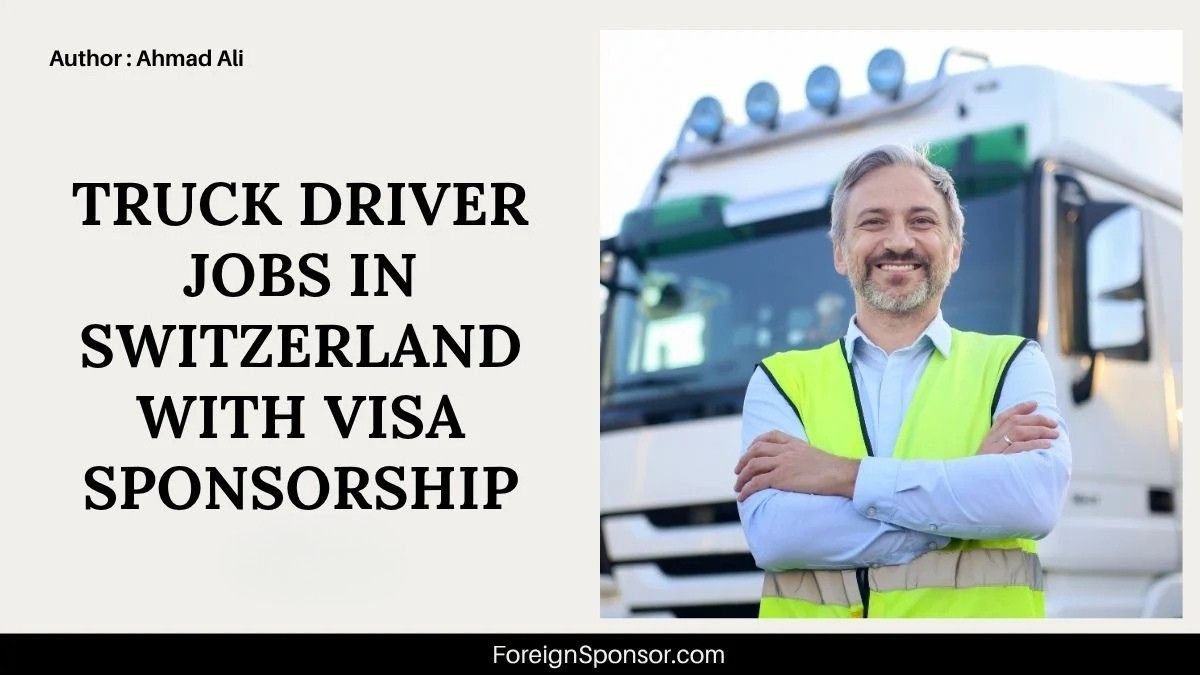How about driving an awesome truck within the beautiful Alpine passes in Switzerland? Imagine transporting essential products to picturesque villages and metropolitan cities. And what if you could receive a high salaried job doing it?
Are you a professional truck driver and live anywhere in the world? Well then, Switzerland has that opportunity waiting just for you, and in 2026, the visa sponsorship is the unlock code to that opportunity.
Why Choose Switzerland as a Truck Driver?
Switzerland is a logistic giant. It lies at the heart of Europe, which makes it an important conduit of transporting products within the continent. The companies always require good drivers to deliver:
- Essential Goods: Food, medicine, industrial supply.
- Retail Products: products to sell in all stores.
- Construction Materials: To be used in continuing infrastructure development.
- International Freight: Within Europe.
This great demand leaves numerous employment opportunities particularly to those drivers possessing the relevant skills. The companies are struggling to get sufficient local drivers.
This is the reason why they are looking overseas and are willing to sponsor visas.
Key Requirements for Truck Drivers in Switzerland (2026)
To be eligible you need to reach certain standards:
Full Driving License: You require a license of heavy vehicles (Category C or C+E). Your license should be valid. Switzerland does in many cases recognize EU licenses with ease. With non-EU licenses, you may be required to swap it or to undergo a Swiss test. Look in the agreement of your country with Switzerland.
Work Experience: Companies seek an experienced professional. Normally they need 2-5 years of experience driving trucks of the sort you will drive in Switzerland.
Clean Driving Record: Safety First. You will be disqualified by a record of serious traffic offences or accidents.
Good Health: You have to undergo a medical examination. Driving a truck is strenuous. You should have good vision, hearing and fitness.
Language Skills: Knowledge of German, French or Italian is essential. Switzerland is a multilingual country. You have to talk with dispatchers, police, and customers. Basic English can be of some use, but to be safe and to work in everyday environment, it is better to know one of local languages. Your goal should be at least A2/B1 (basic to intermediate).
Certificate of Professional Competence (CPC): Most of the positions ask to have the Driver Qualification Card (DQC) or its analogue. This demonstrates your professional knowledge of driving. In case your nation has an equivalent certificate, it may be accepted. Elsewise, you might have to acquire the Swiss CPC.
Job Offer: You must have a definite employment offer by a Swiss company who is ready to sponsor your visa. And without this offer, you are not in a position to apply to the work visa.
Truck Driver Salaries & Benefits in Switzerland (2026)
Switzerland offers some of the world’s highest truck driver salaries. Pay depends on experience, license type, company, and routes. Here’s a clear overview:
| Truck Driver Role in Switzerland | Average Yearly Salary (CHF) | Average Yearly Salary (USD)* | Key Responsibilities |
|---|---|---|---|
| Heavy Goods Vehicle (HGV) Driver / Articulated Lorry Driver | CHF 70,000 – CHF 95,000 | $77,000 – $104,500 | Transporting large loads (e.g., shipping containers, construction materials) across Switzerland and internationally. Requires Category C+E license. |
| Rigid Truck Driver | CHF 60,000 – CHF 80,000 | $66,000 – $88,000 | Driving medium-sized trucks (Category C) for regional deliveries, supermarkets, or waste collection. |
| Specialized Transport Driver (e.g., Refrigerated, Dangerous Goods) | CHF 75,000 – CHF 100,000+ | $82,500 – $110,000+ | Hauling temperature-sensitive goods (food, medicine) or hazardous materials (ADR certified). Requires extra certifications. Higher pay reflects the specialized skills. |
| International Long-Haul Driver | CHF 80,000 – CHF 110,000+ | $88,000 – $121,000+ | Driving across multiple European countries. Involves longer trips and overnight stays. Requires experience with international regulations. |


